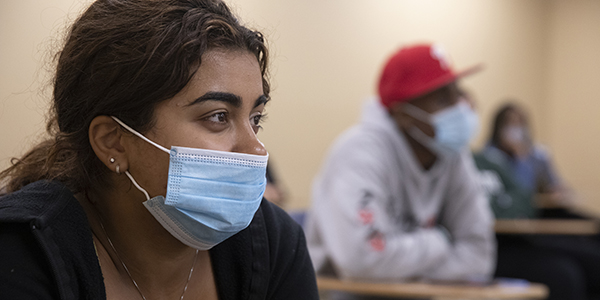A UDiversity Educational Institute workshop
Is there a way to teach all students and still teach every student?

Is there a way to teach all students and still teach every student?
That’s the question posed in the description for the Inclusive Pedagogy workshop for faculty developed by the Division of Diversity, Equity and Inclusion (DEI) and the Center for Teaching and Learning (CLT).
This semester, new faculty are attending a three-session series of inclusive pedagogy workshops to help them become engaged with concepts and activities that connect cultural inclusion and pedagogy into their course development. The first workshop, held Sept. 9, focused on syllabi: Creating a Shared Language.
The workshops have been available through DEI’s UDiversity Educational Institute for some time, in partnership with the University’s Center for Teaching and Learning, said Karen Jones, vice president for diversity, equity and inclusion. This is the first time they have been required for new faculty.
“The feedback has been exceptional,” Jones said. “Faculty understand the work that’s being done, in addition to having a safe place where they can talk about their apprehensions, things they’re learning, what they hope to gain and how they can better understand students.”
“It’s really appropriate to have faculty think about the diverse range of students in their classrooms,” said Don Nieman, executive vice president for academic affairs and provost. “Our classrooms are not homogeneous with students who have the same learning styles and backgrounds. We need to think about this diversity and the diversity of their experiences and how students learn and might apprehend a particular class.”
The majority of new faculty are not only new to Binghamton University, but to teaching as instructors of record, Nieman said. “We want to help them be successful as teachers and part of that is thinking about how a diverse array of how students learn.
“And from the student perspective, we want classes that are engaging and that take into account the range of backgrounds they bring to the classroom, taking advantage of that diversity to create a richer learning environment,” said James Pitarresi, vice provost for online and innovative education and director of the CLT. “The workshops are a great way to convey to faculty that we value diversity and inclusion.”
“These workshops also speak to the need for professional development,” said Jones, who noted that seasoned faculty also participated in the first workshop and are welcome at the others. “These are about faculty engagement and how to impact the lives of students. They will lead to a return on our partnership and help to support teaching and learning. The mission of our institution is to educate students so they can problem solve locally and globally.”
Referring to the common read of Just Mercy and the showing of the film 13th, Jones said the partnership in terms of her staff working with the collegiate professors and other volunteers isn’t “just a one and done.”
“It’s one thing to facilitate a general workshop, but another to facilitate a conversation about race when you haven’t had that experience,” she said. “I see this as the beginning of a fruitful partnership. Our common goal is to support our new faculty; providing them with additional tools to be successful.”
Faculty who participated and engaged with one another will prepare syllabi for courses that they will teach next spring, incorporating what was learned in the workshop, Nieman said.
“Some of the exercises include examining syllabi from another institution and providing feedback and culturally relevant materials,” Jones said. “This helps faculty to think differently about how to structure their syllabi. It’s not just theory, but also providing tools for application as well.”
Though the workshops are virtual, Jones and Nieman see them expanding. “What we’ve done is use feedback from previous surveys to incorporate and update the work that’s being done now,” Jones said. “Our division has always reached out to campus constituencies to make certain the current presentation is relevant and speaking to the current events; current events are used as discussion points to help build the presentation.”
“Our focus is on inclusive pedagogy, broadly conceived,” Nieman added. “Race is very important, but being inclusive goes beyond race and includes gender and disability.”
“It’s much broader,” Jones echoed. “We need to pay attention to so many issues … pronouns, accessibility, issues of gender and national origin.”
The two remaining workshops are:
- The Need for Dialogue: Noon-1:30 p.m. Wednesday, Oct. 14
- Ensuring Academic Success: Noon-1:30 p.m. Wednesday, Nov. 18

